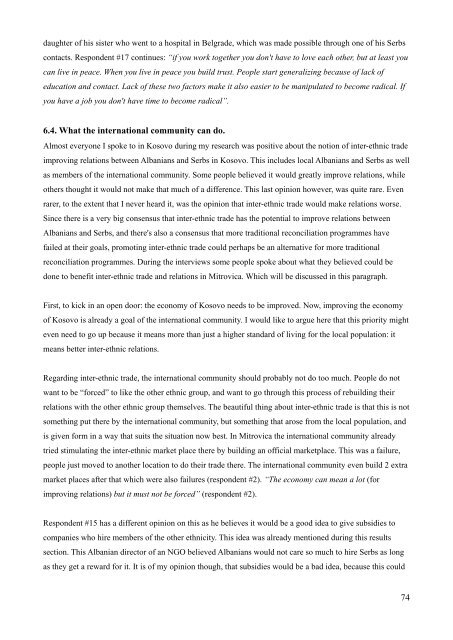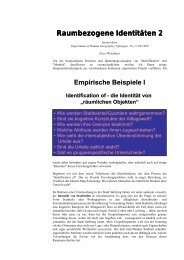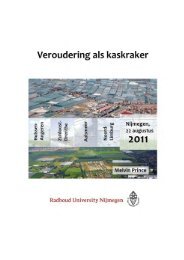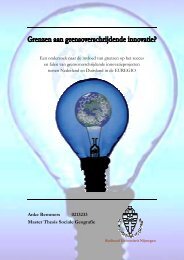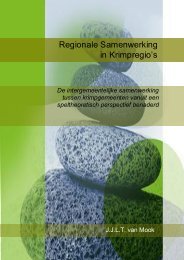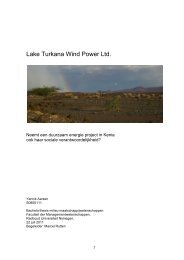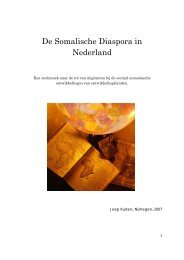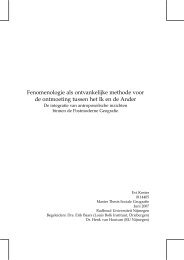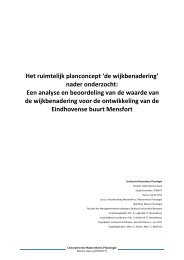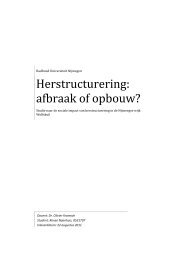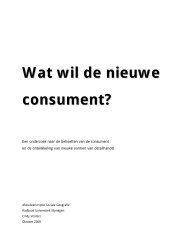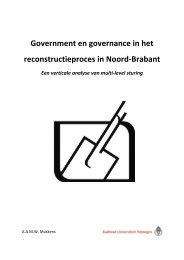Trading with the enemy in Mitrovica, Kosovo. - RUhosting
Trading with the enemy in Mitrovica, Kosovo. - RUhosting
Trading with the enemy in Mitrovica, Kosovo. - RUhosting
Create successful ePaper yourself
Turn your PDF publications into a flip-book with our unique Google optimized e-Paper software.
daughter of his sister who went to a hospital <strong>in</strong> Belgrade, which was made possible through one of his Serbs<br />
contacts. Respondent #17 cont<strong>in</strong>ues: “if you work toge<strong>the</strong>r you don't have to love each o<strong>the</strong>r, but at least you<br />
can live <strong>in</strong> peace. When you live <strong>in</strong> peace you build trust. People start generaliz<strong>in</strong>g because of lack of<br />
education and contact. Lack of <strong>the</strong>se two factors make it also easier to be manipulated to become radical. If<br />
you have a job you don't have time to become radical”.<br />
6.4. What <strong>the</strong> <strong>in</strong>ternational community can do.<br />
Almost everyone I spoke to <strong>in</strong> <strong>Kosovo</strong> dur<strong>in</strong>g my research was positive about <strong>the</strong> notion of <strong>in</strong>ter-ethnic trade<br />
improv<strong>in</strong>g relations between Albanians and Serbs <strong>in</strong> <strong>Kosovo</strong>. This <strong>in</strong>cludes local Albanians and Serbs as well<br />
as members of <strong>the</strong> <strong>in</strong>ternational community. Some people believed it would greatly improve relations, while<br />
o<strong>the</strong>rs thought it would not make that much of a difference. This last op<strong>in</strong>ion however, was quite rare. Even<br />
rarer, to <strong>the</strong> extent that I never heard it, was <strong>the</strong> op<strong>in</strong>ion that <strong>in</strong>ter-ethnic trade would make relations worse.<br />
S<strong>in</strong>ce <strong>the</strong>re is a very big consensus that <strong>in</strong>ter-ethnic trade has <strong>the</strong> potential to improve relations between<br />
Albanians and Serbs, and <strong>the</strong>re's also a consensus that more traditional reconciliation programmes have<br />
failed at <strong>the</strong>ir goals, promot<strong>in</strong>g <strong>in</strong>ter-ethnic trade could perhaps be an alternative for more traditional<br />
reconciliation programmes. Dur<strong>in</strong>g <strong>the</strong> <strong>in</strong>terviews some people spoke about what <strong>the</strong>y believed could be<br />
done to benefit <strong>in</strong>ter-ethnic trade and relations <strong>in</strong> <strong>Mitrovica</strong>. Which will be discussed <strong>in</strong> this paragraph.<br />
First, to kick <strong>in</strong> an open door: <strong>the</strong> economy of <strong>Kosovo</strong> needs to be improved. Now, improv<strong>in</strong>g <strong>the</strong> economy<br />
of <strong>Kosovo</strong> is already a goal of <strong>the</strong> <strong>in</strong>ternational community. I would like to argue here that this priority might<br />
even need to go up because it means more than just a higher standard of liv<strong>in</strong>g for <strong>the</strong> local population: it<br />
means better <strong>in</strong>ter-ethnic relations.<br />
Regard<strong>in</strong>g <strong>in</strong>ter-ethnic trade, <strong>the</strong> <strong>in</strong>ternational community should probably not do too much. People do not<br />
want to be “forced” to like <strong>the</strong> o<strong>the</strong>r ethnic group, and want to go through this process of rebuild<strong>in</strong>g <strong>the</strong>ir<br />
relations <strong>with</strong> <strong>the</strong> o<strong>the</strong>r ethnic group <strong>the</strong>mselves. The beautiful th<strong>in</strong>g about <strong>in</strong>ter-ethnic trade is that this is not<br />
someth<strong>in</strong>g put <strong>the</strong>re by <strong>the</strong> <strong>in</strong>ternational community, but someth<strong>in</strong>g that arose from <strong>the</strong> local population, and<br />
is given form <strong>in</strong> a way that suits <strong>the</strong> situation now best. In <strong>Mitrovica</strong> <strong>the</strong> <strong>in</strong>ternational community already<br />
tried stimulat<strong>in</strong>g <strong>the</strong> <strong>in</strong>ter-ethnic market place <strong>the</strong>re by build<strong>in</strong>g an official marketplace. This was a failure,<br />
people just moved to ano<strong>the</strong>r location to do <strong>the</strong>ir trade <strong>the</strong>re. The <strong>in</strong>ternational community even build 2 extra<br />
market places after that which were also failures (respondent #2). “The economy can mean a lot (for<br />
improv<strong>in</strong>g relations) but it must not be forced” (respondent #2).<br />
Respondent #15 has a different op<strong>in</strong>ion on this as he believes it would be a good idea to give subsidies to<br />
companies who hire members of <strong>the</strong> o<strong>the</strong>r ethnicity. This idea was already mentioned dur<strong>in</strong>g this results<br />
section. This Albanian director of an NGO believed Albanians would not care so much to hire Serbs as long<br />
as <strong>the</strong>y get a reward for it. It is of my op<strong>in</strong>ion though, that subsidies would be a bad idea, because this could<br />
74


